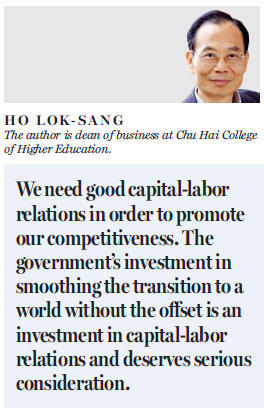Mid-stream revision over MPF offset unfair to existing businesses
Updated: 2017-07-18 07:41
By Ho Lok-sang(HK Edition)
|
|||||||
When I wrote on the Mandatory Provident Fund long-service and severance pay offset issue earlier (Dec 28, 2016), how the special administrative region government was going to tackle the subject was still unclear. Today the announcement has been made and it turns out that the version being circulated at the time was indeed the policy package adopted by the government. The government proposes to disallow the offset as of the first day of this year but within the 10 years from that date it will help alleviate employers' burden through a subsidy, which amounts to HK$7.9 billion.
After the transition period, employers will shoulder their new burdens completely, although these are to be reduced by revising the severance and long-service payment formula, which will use half of the last month's salary instead of two-thirds as before, to be multiplied by the number of years of service.

The proposed policy package, already passed by the Executive Council, as expected met with anger on the part of both employers and employees, because employers hold the government to task for breaking the promise to allow offset, on the basis of which they agreed to the new contributions as required by the MPF Schemes Ordinance, while employees hold the government to task for undermining their established benefits and terms of employment. In my article last year, my simple proposal was just for the government to take over the burden resulting from abolishing the offset. The fact is that within the 15 years since 2001, the cumulative offset amount was a mere HK$3.18 billion. This figure is often less than the value of "sweeteners" given to Hong Kong citizens in a single year when the financial secretary discovered the budget surplus was bigger than expected. For this reason, I argued that since the government had promised the business sector it would allow the MPF offset in order to win its support to pass the MPF bill, it should not renege on that promise. At the same time, we really should not expect labor would accept that conditions of work should worsen over time. In any case, employees do expect that they should benefit from economic development. Dashing this expectation will harm employees' sense of engagement and motivation.
An objection to this "generous" use of taxpayers' money to pay for the transition to a world without MPF severance pay offset is that the cost to the government down the road could be unbearable. Although the total amount of money involved over the first 15 years of the MPF's history was a mere HK$3.16 billion, the amount could become unbearable into the indefinite future. Against this worry I suggest we can follow the government's suggestion to set a date to contain the cost. But this date is not a date to affect businesses already in existence. The date to set is to require businesses set up after that date to be entirely on their own in footing the bill both for MPF contributions and severance pay. This means only new businesses will be affected. Entrepreneurs will take the cost of the MPF and possible severance pay as part of their normal business cost. If they figure their incomes cannot cover these costs they have the option not to go into business. But for existing businesses, if the government had approved the offset, that is what they came to expect. Changing rules in the middle of the game is just not right.
Thus the cost borne by taxpayers to defray the unexpected cost of disallowing the offset is contained. But some may still argue that the cost is still big, and businesses should expect that policies can change. My answer to that is that most of the existing businesses face a more difficult business environment now than when the offset was first allowed. If they had needed the offset then, they would need the offset even more now. Because of this they are going to fight to the end. An eternal struggle between employers and employees will hurt productivity and social harmony. We must not forget that these costs are real costs to society. The longstanding grievances of labor groups and the discontent of struggling businesses may end up hurting Hong Kong in a myriad of ways, not least the trustworthiness of the government. The exchange of words between employee and employer groups also suggests capital-labor relations are likely to sour. Honorary President of the Chinese General Chamber of Commerce Ho Sai-chu insisted that the offset was nothing like washing away the MPF funds, and that under the offset the MPF funds were still there, but part of that was taken out as severance pay. "Employees could put them back in if they want." This kind of language is unlikely to help improve capital-labor relations.
We need good capital-labor relations in order to promote our competitiveness. The government's investment in smoothing the transition to a world without the offset is an investment in capital-labor relations and deserves serious consideration.
(HK Edition 07/18/2017 page8)